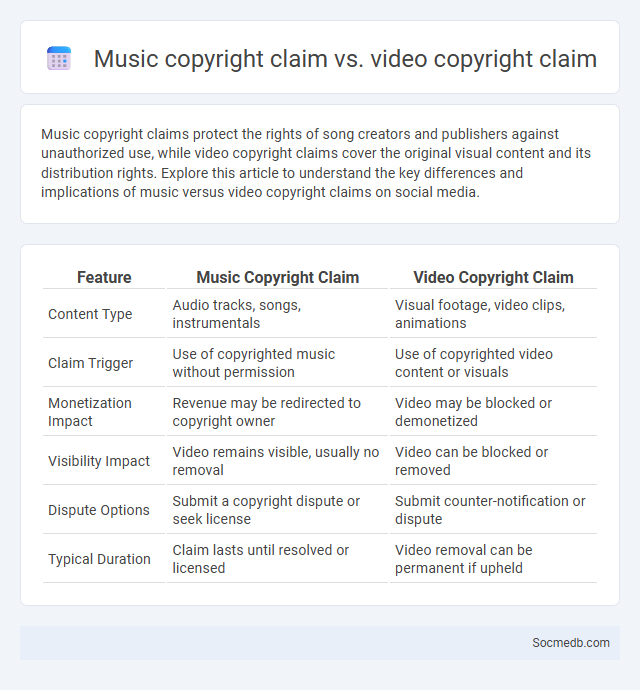
Photo illustration: Music Copyright Claim vs Video Copyright Claim
Music copyright claims protect the rights of song creators and publishers against unauthorized use, while video copyright claims cover the original visual content and its distribution rights. Explore this article to understand the key differences and implications of music versus video copyright claims on social media.
Table of Comparison
| Feature | Music Copyright Claim | Video Copyright Claim |
|---|---|---|
| Content Type | Audio tracks, songs, instrumentals | Visual footage, video clips, animations |
| Claim Trigger | Use of copyrighted music without permission | Use of copyrighted video content or visuals |
| Monetization Impact | Revenue may be redirected to copyright owner | Video may be blocked or demonetized |
| Visibility Impact | Video remains visible, usually no removal | Video can be blocked or removed |
| Dispute Options | Submit a copyright dispute or seek license | Submit counter-notification or dispute |
| Typical Duration | Claim lasts until resolved or licensed | Video removal can be permanent if upheld |
Understanding Music Copyright Claims
Music copyright claims on social media platforms protect artists' intellectual property by identifying unauthorized use of copyrighted tracks in videos and posts. Platforms like YouTube, Facebook, and Instagram utilize automated content recognition systems such as Content ID to detect and manage copyright conflicts efficiently. Understanding the specifics of copyright policies and claim resolution processes helps creators avoid takedowns, monetize content properly, and ensure compliance with music licensing laws.
Video Copyright Claims Explained
Video copyright claims arise when copyrighted content is used without proper authorization on social media platforms like YouTube, Instagram, or TikTok. These claims can lead to video removal, demonetization, or channel strikes under Digital Millennium Copyright Act (DMCA) regulations. Understanding copyright policies and utilizing licensed or original content helps creators avoid legal disputes and maintain platform compliance.
What is a General Copyright Claim?
A General Copyright Claim on social media occurs when a user's content is flagged for allegedly infringing on copyrighted material, such as music, videos, or images. This claim can result in restrictions on your post, including removal or demonetization, impacting content visibility and revenue potential. Understanding how to dispute or resolve these claims is crucial to maintaining control over your social media presence and protecting your original work.
Key Differences Between Music and Video Copyright Claims
Music copyright claims on social media predominantly involve audio content, targeting melodies, lyrics, and sound recordings, while video copyright claims extend to visual elements such as footage, graphics, and animations. Music claims often result in revenue sharing or muting of the audio track, whereas video claims may lead to content removal or blocked video playback. Platforms like YouTube and Facebook use automated detection systems like Content ID and Rights Manager to enforce these distinct copyright rules for music and video content.
How Copyright Claims Impact Content Creators
Copyright claims can significantly restrict content creators by limiting their ability to monetize and share their original work on social media platforms. These claims often result in content removal, demonetization, or channel strikes, which affect creators' income and audience reach. Understanding platform-specific copyright policies and utilizing fair use principles are essential strategies for content creators to protect their work and maintain their digital presence.
Steps to Handle a Music Copyright Claim
To handle a music copyright claim on social media, you should first review the claim details thoroughly to understand the specific content flagged. Next, you must assess if the use falls under fair use, permissions, or licensing agreements, providing proof if applicable. Finally, submit a counter-notification or appeal through the platform's designated process to resolve the claim and protect your content rights.
Responding to Video Copyright Claims
Responding to video copyright claims on social media requires understanding platform-specific copyright policies and submitting a timely counter-notification if the claim is inaccurate. Content creators should gather evidence proving original ownership or fair use before filing disputes to prevent video removal or account penalties. Effective management of copyright claims protects channel reputation and ensures continuous content availability.
Copyright Claim Outcomes: Strikes, Demonetization, and Takedowns
Copyright claim outcomes on social media typically include strikes, demonetization, and content takedowns, each impacting user accounts and content visibility differently. Strikes on platforms like YouTube can lead to temporary account restrictions or permanent bans after multiple violations, while demonetization removes revenue opportunities without deleting content. Takedowns involve the complete removal of infringing posts, often initiated through automated detection systems or copyright holder complaints, affecting creators' audience reach and engagement.
Preventing Copyright Claims on Your Content
Protect your content on social media by using original materials and securing proper licenses for third-party resources to prevent copyright claims. Employ digital watermarks and metadata tagging to establish ownership and deter unauthorized use. Regularly monitor your posts using copyright detection tools to address potential infringements promptly and maintain compliance with platform policies.
Fair Use and Copyright Claims: What You Need to Know
Fair Use allows you to share copyrighted content on social media for purposes like commentary, criticism, or education without infringement, but it applies under specific conditions including the amount and nature of the content used. Understanding the nuances of copyright claims is crucial for protecting your posts from removal or disputes, as social media platforms employ automated systems that may flag content even when Fair Use applies. To safeguard your online presence, always provide proper attribution and evaluate your use against legal Fair Use criteria before sharing copyrighted material.
 socmedb.com
socmedb.com